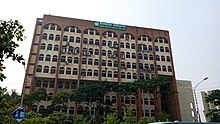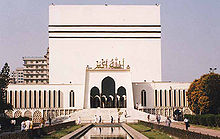Islamic Foundation Bangladesh
| ইসলামিক ফাউন্ডেশন বাংলাদেশ | |
 Logo of Islamic Foundation Bangladesh | |
 Head office of Islamic Foundation Bangladesh | |
| Formation | 22 March 1975 |
|---|---|
| Founder | Sheikh Mujibur Rahman |
| Type | Islamic education, Publication and research activities |
| Headquarters | Islamic Foundation Bangladesh, Agargoan, Sher-e-Bangla Nagar, Dhaka, Bangladesh |
Region served | Bangladesh |
Official language | Bengali |
| A F M Khalid Hossain | |
| Abdus Salam Khan[1] | |
| Mohammad Ismail Hossain | |
Main organ | |
Parent organization | Ministry of Religious Affairs |
| Budget | Allocated by Government |
| Staff | 1477 |
| Website | islamicfoundation |
Islamic Foundation Bangladesh (Bengali: ইসলামিক ফাউন্ডেশন বাংলাদেশ) is a government organization under the Ministry of Religious Affairs in Bangladesh working to disseminate values and ideals of Islam and carry out activities related to those values and ideals.[2][3] The head office of the foundation is in Dhaka, which is supported by 6 divisional offices and 64 district offices, as well as 7 Imam Training Academy Centers and 29 Islamic Mission Centers.[3] The director general is the chief executive of the foundation.[3]
History
[edit]
In 1959, two organizations were formed in Dhaka, Bangladesh to propagate the teachings and following of Islam. The Baitul Mukarram Society built the Baitul Mukarram (Arabic: بيت المكرّم; the holy house) mosque and Islamic scholars formed a Darul Ulum (Arabic: دار العلوم; house of knowledge) to popularize and research on Islamic philosophy, culture and way of life.[2] In 1960, the Darul Ulum was renamed as Islamic Academy and was made a branch of Central Institute of Islamic Research based in Karachi.[2]
The current organization came into effect in 1974, when Sheikh Mujibur Rahman formally inaugurated as the Islamic Foundation.[4]
On 20–22 March 1978, the foundation organized a seminar sponsored by the OIC and attended by representatives of 16 countries including Bangladesh.[2] In 1979–80, development of the foundation got a new momentum.[2]
Controversy
[edit]In 2015, Islamic Foundation Bangladesh issued a fatwa banning the use of chairs for elderly worshipers in mosques. The head of the foundation, Shamim Afzal told Agence France-Presse, "There are no instances of the Prophet praying while sitting on a chair," despite numerous hadiths contradicting this claim.[5] He added that "chairs spoiled the beauty of the mosques."[5]

This led to outrage and protest from more erudite ulema, who termed it "an incorrect and exaggerated decision."[5][6] The Prime Minister Sheikh Hasina issued a statement that she was "stunned" by such a fatwa, terming it incorrect. She added that she herself offered prayers in chairs during flights.[7]
See also
[edit]References
[edit]- ^ "officer list". 23 September 2024.
- ^ a b c d e Amran, Syed Mohammed Shah; Ali, Syed Ashraf (2012). "Islamic Foundation Bangladesh". In Islam, Sirajul; Jamal, Ahmed A. (eds.). Banglapedia: National Encyclopedia of Bangladesh (Second ed.). Asiatic Society of Bangladesh.
- ^ a b c "Islamic Foundation". Bangladesh Directory. Archived from the original on 11 August 2017. Retrieved 25 December 2007.
- ^ "Country to be run as per Madinah Charter: PM". The Daily Star. UNB. 22 March 2014. Retrieved 28 April 2016.
- ^ a b c "Prayers on chairs ban sparks outrage in Bangladesh". The Express Tribune. AFP. 2 June 2015. Retrieved 7 June 2015.
- ^ "Bangladeshis Decry Chairs Ban in Mosques". OnIslam.net. Retrieved 7 June 2015.
- ^ Tusher, Hasan Jahid (2 June 2015). "Islamic Foundation fatwa incorrect: Prime Minister Sheikh Hasina tells cabinet meeting, says she herself offers prayers in chairs during flights". The Daily Star. Retrieved 7 June 2015.
